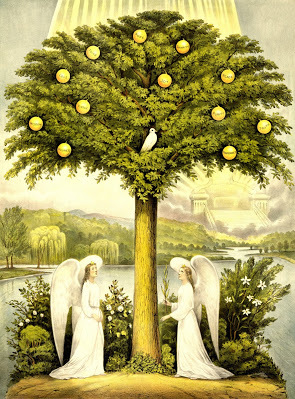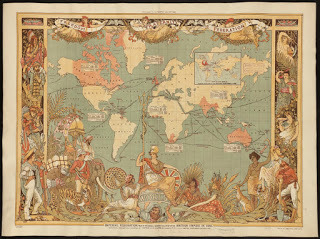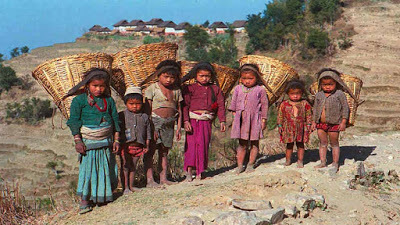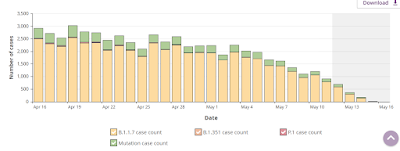Stephen Roney's Blog, page 198
May 24, 2021
The Real World of Discrimination
 The much-despised Tree of Life, in Kabbalistic symbolism: a representation of the attributes of God.
The much-despised Tree of Life, in Kabbalistic symbolism: a representation of the attributes of God.Caitlin Press in Tofino is calling for poems for an anthology about trees: ideally poems that “dispel the myth of hazardous and inconvenient trees.”
This is striking, because there are no such myths. In every known culture, trees are venerated. Which is why there is a market for an anthology of poems about trees. People love trees.
 The much-despised Christian Tree of Life
The much-despised Christian Tree of LifeThis points to a common phenomenon. There is a persistent tendency to declare things or groups that are especially favoured to be or to have been discriminated against. Conversely, things or groups that have genuinely experienced discrimination get no love. In fact, this almost goes without saying: you are automatically not discriminating against any group you lament as being discriminated against.
For example, we are told endlessly that women have faced discrimination throughout history. Yet demonstrably, current laws discriminate in their favour in myriad ways. This is also true historically: women have always been put on pedestals. In many cultures, women were exempt from prosecution for any crimes; they were protected in times of war, rather than being sent to the front; and on and on. The exalted status of women has always been, in a phrase, a “motherhood issue.” And this is biologically hard-wired. Men are expendable, but women are not: they are needed to ensure the survival of the tribe.
We in Canada are told incessantly, and have always been told, that Indians have been discriminated against. Yet they are demonstrably given more rights than other Canadians: special treaty rights, a wide range of benefits not available to other Canadians. Any history of the Indian in literature reveals an unrealistic reverence for the “noble savage.” Everyone has always wanted to be an Indian, in Canada and in the US. And no, their land was never taken or stolen from them—a subject that might take us, for the moment, too far afield.
What about African Americans? Everybody agrees they have been discriminated against; and surely they have a legitimate grievance? After all, they were enslaved. But compare the Irish; the Irish too were enslaved in the New World, if not perhaps to a comparable extent. Indentured servitude. Moreover, the Irish, unlike the blacks, have been systematically oppressed wherever they lived for about five hundred years, including a mass starvation in the middle of the last century. About the same time slavery was abolished—after it was abolished throughout the British Empire. On balance, then, the Irish have arguably had a tougher time of it for longer. Yet there is little or no sympathy for the Irish. Current laws discriminate in favour of African Americans; and against Irish Americans.
It may be disturbing to accept it, but chattel slavery was thought throughout its existence to be of benefit to the African American slaves. They were understood to be unable to look after themselves properly, whether due to genetic incapacity or lack of civilization, and, like children, were to be taken care of. They were not hated or despised, any more than children are.
The Irish, by contrast, were hated and despised.
Who has authentically been persecuted and discriminated against, in recent times? The Jews. Within living memory, there has been a systematic and international attempt to exterminate the Jews. Compare African American slavery—never meant to harm, and abolished a hundred and fifty years ago. Anti-Semitic attacks are still the most common hate crime in Canada, and are on a rapid upswing across North America and Europe. Yet there is little public attention to it; if anything, it seems to be encouraged by some public figures.
The Poles. As many Poles as Jews were executed by Hitler in his camps; their country was carved up and enslaved in turn by Germany, Austria, Russia, and the Soviets. Yet Poles remain one ethnic group it is still acceptable to lampoon. Polish jokes are more or less okay in polite company.
There was something like an attempt to wipe out the Ukrainians within living memory. Yet Ukrainians remain another ethnic group it is still acceptable to lampoon.
There was a concerted attempt to wipe out the Armenians barely a hundred years ago. It may not be fashionable to mock Armenians, but there is also no sympathy for them.
Who else has known great suffering in recent decades? The Koreans suffered a brutal occupation and something like a genocide under the Japanese, from 1911 to 1945, after which they lived through a devastating war. The Filipinos suffered more under Japanese occupation, reputedly, than any other occupied nation during the Second World War. It was not a matter of discrimination, but the Chinese and the Cambodians suffered holocausts of historic proportions within the lifetimes of many, and the Vietnamese lived through perhaps thirty years of scorched-earth war. Yet these groups are given no consideration in North America; instead, they are systematically discriminated against.
To be fair, African Americans, Indians, and perhaps women have a legitimate grievance, that they have not thriven despite the special help they have been given throughout recent history. Conversely, the Irish, the Jews, the Armenians, the Poles, the Ukrainians, have been successful, even notably successful, despite persecution.
But that is neither here nor there. Being coddled is not necessarily to one’s long-term benefit, because it strips you of self-reliance. It gives you unrealistic expectations, and, when they are not met, leaves you capable of doing little but complaining loudly.
These two unlucky fates, being genuinely discriminated against and being coddled, correspond to two common fates within a dysfunctional family. One child will be spoiled into arrested development, and will grow up to be a narcissist. The next child will be tormented, but, if they survive and survive without being permanently crippled, may even be stronger for the experience. They may grow up to be a hero.
'Od's Blog: Catholic comments on the passing parade.
May 23, 2021
Too Many People

Friend Xerxes notes that he finds individuals almost invariably kind, while society as a whole is systemically at least nearsighted.
I am completely in agreement with his claim that individuals are more trustworthy than people in groups. What he presumably does not see is that this, if true, is a powerful argument for free markets and individual liberty, as opposed to government control and group identity. In other words, for the right and not the left.
Xerxes, on the other hand, is probably trying to argue for original blessedness; for the idea that people are innately, naturally good, and will always do good if they just follow their instincts—a romantic notion, in the proper sense of the word. Therefore, impositions on instinct from “society”—formal ethics—are the source of all evil.
But the basic claim, that individuals are usually more trustworthy than groups, is in accord with what we all can observe: mobs are irresponsible and dangerous.
The problem is with identifying the mechanism to explain this. If you assume that people are all individually good, yet corrupted by society, you have a classic “problem of evil.” Society is a human creation. If people are good, yet society is evil, where did the evil come from?
Xerxes’s theory is that people are good only in moderation. The evil comes somehow from there being too many in one place. He uses, among others, the analogy of a campfire versus a forest fire. Too much fire is bad; too many people are bad.
But the difference between a campfire and a forest fire is not quite that. It is that the campfire is under control, and the forest fire is not. A fire in a waste paper basket is probably smaller than a campfire, but it is still bad. A controlled burnoff of a field is a common agricultural practice, and it might easily be larger than a forest fire. A nuclear reactor is a rather bigger fire in a sense than a forest fire, but can be useful.
So with people. The problem is not more or fewer of them, but whether they are controlling their animal instincts and their selfishness. As individuals, we are obliged to take responsibility for our acts, so our conscience is engaged. If we pass our individual responsibility over to the group, we can more easily shirk our conscience. We can let our sinister tendencies “run riot,” to use the familiar phrase. This is most evident in a mob, but a clear danger in any group. “I was only following orders.”
This is because, like fire, we already have those sinister tendencies. This cannot support a romantic idea of original blessedness. The bad tendency must already exist at the individual level; but be held in check.
Trying to find an analogy that might work better to justify Xerxes’s concept of innate human goodness, I thought of locusts. According to at least some theories, they change from relatively benign to humans to a plague due to overcrowding—due, then, to sheer numbers, more or less. But again, this does not really work in support of his concept of humans, because each individual locust also transforms in nature. In Xerxes’s human model, the individual remains good even as the society in which he or she participates misbehaves.
I have read that lab rats, if overcrowded, begin to bite one another. Perhaps this is more apt, but it still does not work. Each bite is an individual, not a group, action. The individual does not remain moral while the group imposes immorality.
Given the correct observation that people behave better individually than in groups, we are left needing to acknowledge the concept of original sin. The tendency to evil as well as good must be innate at the level of the individual.
There is also something troublesome, surely, in the very concept of “too many” humans. Too many for what? If your measure is what is good for humans, surely existing is the most fundamental of goods. If your standard is not what is good for humans, what is your standard? The obvious suspicion is that it is what is good for yourself…
'Od's Blog: Catholic comments on the passing parade.
May 22, 2021
Happy Empire Day
This year, unusually, the 24th of May falls on the 24th of May.
It is a day hallowed to all Canadians, although few remember why we celebrate. It is Queen Victoria’s Birthday. In one sense Canada’s founder, this woman presided over the greatest empire the world has ever known for an unprecedentedly long time, as though she were as certain a feature of the cosmos as the North Pole. Little Alexandrina Victoria Hanover was born on May 24, 1819, as the first steamship was crossing the Atlantic. She died in 1901, just before the world went to hell.
Traditionally, her birthday was one of Canada’s two “national” days. This is Empire Day, on which we celebrated our birthright as British subjects, paired with Dominion Day on July 1st, on which we celebrated ourselves as Canadian citizens.
It remains important, even though the sun has long set, as the traditional start of the cottaging season, bookended now with Labour Day in September. One had to get outside for a barbeque or a picnic on this Monday, damn the weather. I can remember years with coats and mittens and picnic sandwiches cruelly cold. It is not easy to eat a picnic sandwich in mittens.
The evening ended gloriously with fireworks, from Hands or Brock, bought in some shop on the main street that specialized in them seasonally. The finale always had to be the Burning Schoolhouse, to celebrate the coming end to the school year. You would stuff in all the duds in hopes of getting something spectacular, but most often, and perhaps most satisfyingly, it generally ended in a slow, quiet burn.
No more pencils, no more books… and the glorious summer stretching before us, on which the sun barely set.
Happy birthday, Queen Victoria; reminding us of a time when the world still made sense.






'Od's Blog: Catholic comments on the passing parade.
May 21, 2021
Scott Adams Discovers Narcissism
Previously a sceptic, Scott Adams discovers narcissism is real, and gives a decent account of it.
'Od's Blog: Catholic comments on the passing parade.
Community Spirit
 A community gathering in Nuremberg
A community gathering in NurembergAn annoyingly common phrase in the popular culture these days is “my community,” or “the X community.”
Community is a good thing, but in this case, it does not refer to a neighbourhood or small town. It refers to a tribe: “the black community”; “the LGBTQ community.” It implies that you have nothing in common with, and do not want to spend any time with, anyone who does not share some random, usually physical, characteristic.
It is radical apartheid.
'Od's Blog: Catholic comments on the passing parade.
May 19, 2021
Hell on Earth

Since childhood modern suburbs have horrified me. What could be worse than living in one? The deadening sameness; the lack of any sense of community; the labyrinthine streets designed to be hostile to escape. They are the stuff of nightmares. They seem designed to promote conformity. Just as might be most desirable to an oppressive totalitarian government.
It is apparently not just me who thinks so. Locally, there have always been jokes about having to live in "Scarberia." Yet people are forced to do so, everywhere, against their will.
They are also oppressive to the poor. They make it necessary to own a car, and to use it to do anything. They require you to pay for a front yard, of no use to you. They offer no inexpensive row housing or apartments. They prohibit any jobs nearby.
The cities of Europe or Asia are infinitely more interesting and charming; and not because they are older. When I lived in Seoul, it was a revelation that even the remotest suburbs had charm, street life and amenities. And densities to support decent public transit.
The problem is zoning bylaws. It seems to me that zoning bylaws have always been used maliciously. Urban planning has always been malicious. Give somebody such power over others, and you will attract the power-mad. Other than setting aside some land for parks, streets, and public utilities, a mere absence of rules would have produced a better result. The market would have forced development of just what people wanted and most needed. We would have diversity. We would have services and work nearby. We would not have the frightening housing shortages and high housing costs we now face in Canada. Nor would we have the urban sprawl and high carbon dioxide emissions environmentalists so lament.
It could all be fixed, if not quickly, by repealing zoning bylaws. That’s a cause I wish some provincial or municipal political party would take up.
'Od's Blog: Catholic comments on the passing parade.
May 18, 2021
Schitt's Creek
Having been through the entire original run of Corner Gas, I’m now binge-watching Schitt’s Creek. After a couple of decades abroad, it is a good reorientation to Canadian culture.
Both follow the Canadian tradition of focusing on small town life; like Sunshine Sketches, Anne of Green Gables, or Alice Munro. But they are very different in tone. Corner Gas relies on a more distinctly Canadian sort of comedy: nobody is allowed to take themselves too seriously. Nobody is better than anybody else. There is no fourth wall. And it is laugh-out-loud funny.
Schitt’s Creek is more like an American comedy in having both straight men and clowns. You are supposed to laugh at some characters, not others. Some are serious. The overall tone is more serious; people can get hurt. And I have only been moved to laugh out loud once in the first season.
One element, however, besides the occasional place references, makes Schitt’s Creek feel Canadian. Formulaically in comedy, since the ancient Greeks, characters we are supposed to laugh at are from the lower class, and most often rural: “clown” originally meant a hayseed.
Compare Green Acres, an old American sitcom built on a premise similar to Schitt’s Creek. We were expected to see it all from the point of view of the city people; the rurals were exotics. Or Beverley Hillbillies, a reverse of the Schitt’s Creek premise: the rurals were sympathetic characters, but odd and foolish.
Now look at Schitt’s Creek. The rurals are the straight men; we are to laugh at the odd and foolish upper class people from the city. The locals are more sensible, and always outsmart them.
This strikes me as an expression of the Canadian character. Culturally, we are profoundly democratic, and an essentially rural people.
'Od's Blog: Catholic comments on the passing parade.
May 17, 2021
Nasty Rumours Are Starting That the Pandemic Is Almost Over
60 Minutes on UFOs
https://www.cbsnews.com/video/ufo-military-intelligence-video-60-minutes-2021-05-16/#x
The Growing Threat of Affordable Housing
 Poor people: not as spiritually uplifting to look at as wildflowers.
Poor people: not as spiritually uplifting to look at as wildflowers.Friend Xerxes laments that a local hiking trail he has been accustomed to use to view wildflowers has now been fenced off to allow the construction of a new subdivision. “In our social structure,” he observes, “private property is close to sacred.”
He gets that just about backwards.
The basic premise on which our common law is founded is that nobody can really own land.
Land is God’s creation, and is therefore meant by him for the use of all mankind—just as we assume with air or water.
One does not actually own the land, but the labour one has put into it. If this is inseparable from the land itself, that establishes ownership.
This is why we have “squatter’s rights.” If land is lying unused, anyone who builds on it or tills it or seeds it establishes ownership. This supersedes any paper deed.
This means that any government is acting illegitimately if it prohibits productive use of land; if it leaves land as wilderness. So long as anyone genuinely needs that land in order to grow food, it is immoral to refuse this. So long as someone genuinely needs that land to build shelter, it is immoral to refuse this.
To justify preserving a local hiking trail, you need to argue that this use of that land is most beneficial even to the poorest of citizens. Ultimately, not just the citizens of the local area, but all mankind.
Unfortunately, we have lost sight of this. The poor are suffering everywhere as a result.
'Od's Blog: Catholic comments on the passing parade.





